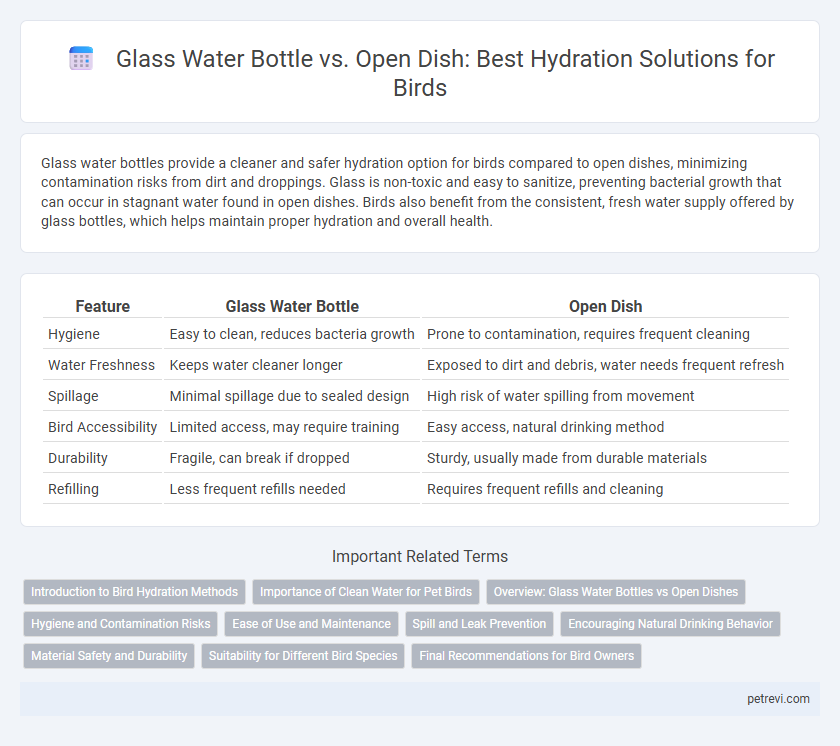Glass water bottles provide a cleaner and safer hydration option for birds compared to open dishes, minimizing contamination risks from dirt and droppings. Glass is non-toxic and easy to sanitize, preventing bacterial growth that can occur in stagnant water found in open dishes. Birds also benefit from the consistent, fresh water supply offered by glass bottles, which helps maintain proper hydration and overall health.
Table of Comparison
| Feature | Glass Water Bottle | Open Dish |
|---|---|---|
| Hygiene | Easy to clean, reduces bacteria growth | Prone to contamination, requires frequent cleaning |
| Water Freshness | Keeps water cleaner longer | Exposed to dirt and debris, water needs frequent refresh |
| Spillage | Minimal spillage due to sealed design | High risk of water spilling from movement |
| Bird Accessibility | Limited access, may require training | Easy access, natural drinking method |
| Durability | Fragile, can break if dropped | Sturdy, usually made from durable materials |
| Refilling | Less frequent refills needed | Requires frequent refills and cleaning |
Introduction to Bird Hydration Methods
Bird hydration methods include the use of glass water bottles and open dishes, each offering unique benefits for maintaining proper bird hydration. Glass water bottles provide a clean, contamination-resistant source of water, reducing the risk of bacterial growth, while open dishes allow birds easy access and encourage natural drinking behavior. Understanding these hydration options ensures optimal bird health and hydration management.
Importance of Clean Water for Pet Birds
Clean water is essential for pet birds to maintain optimal health and prevent bacterial infections. Glass water bottles offer a hygienic solution by minimizing contamination compared to open dishes, which are more prone to dirt, droppings, and bacteria buildup. Ensuring access to fresh, uncontaminated water supports hydration, digestion, and overall well-being in avian pets.
Overview: Glass Water Bottles vs Open Dishes
Glass water bottles offer hygienic, spill-resistant hydration for birds, reducing contamination risks and maintaining cleaner water compared to open dishes. Open dishes provide easy access and encourage natural drinking behavior but can accumulate debris, promoting bacterial growth if not cleaned frequently. Choosing between the two depends on factors like bird species, habitat cleanliness, and owner maintenance commitment.
Hygiene and Contamination Risks
Glass water bottles provide a more hygienic option for bird hydration compared to open dishes, as they prevent dirt, debris, and bird droppings from contaminating the water. Open dishes are prone to bacterial growth due to exposure to air and potential accumulation of food particles, increasing the risk of infections in birds. Regular cleaning is essential for both, but glass bottles offer a closed environment that minimizes contamination and helps maintain cleaner water.
Ease of Use and Maintenance
Glass water bottles offer a hygienic and spill-resistant hydration solution for birds, making them easy to refill and clean due to their smooth, non-porous surfaces. Open dishes provide birds with immediate, unrestricted access to water but require frequent cleaning to prevent bacterial growth and contamination. Choosing between the two depends on balancing ease of daily maintenance with the bird's natural drinking behavior and safety preferences.
Spill and Leak Prevention
Glass water bottles provide superior spill and leak prevention for bird hydration compared to open dishes, as their enclosed design minimizes water wastage and maintains cleanliness. Open dishes are more prone to tipping and contamination, increasing the risk of bacterial growth and dehydration for birds. Using a glass water bottle ensures a consistent and hygienic water supply, essential for bird health and well-being.
Encouraging Natural Drinking Behavior
Glass water bottles promote natural drinking behavior in birds by mimicking the way they access water in the wild, encouraging beak manipulation and reducing water contamination. Open dishes, while providing easy water access, often lead to stagnant water and increased risk of bacterial growth, which can discourage birds from drinking consistently. Using glass water bottles supports healthier hydration habits by combining cleanliness with natural interaction patterns.
Material Safety and Durability
Glass water bottles provide a safer hydration option for birds due to their non-toxic and chemical-free material, preventing potential leaching of harmful substances. These bottles are highly durable, resistant to scratches, and can withstand frequent cleaning without degrading, ensuring long-term use and hygienic water supply. In contrast, open dishes may be prone to contamination and breakage, posing risks to bird health and requiring more frequent replacement.
Suitability for Different Bird Species
Glass water bottles provide a hygienic and spill-resistant hydration option ideal for small to medium bird species such as finches, canaries, and parakeets, preventing bacterial growth and water contamination. Open dishes better suit larger or ground-feeding birds like pigeons, doves, and parrots, allowing easy access and accommodating their drinking and bathing behaviors. Selecting the right hydration method depends on bird size, species, and natural drinking habits to ensure optimal health and comfort.
Final Recommendations for Bird Owners
Glass water bottles provide a hygienic and spill-resistant hydration source for birds, reducing contamination risks and ensuring cleaner drinking water. Open dishes allow birds easy access for drinking and bathing, promoting natural behaviors but require frequent cleaning to prevent bacterial growth. For optimal bird hydration, use a glass water bottle supplemented with an open dish cleaned daily to balance safety and natural engagement.
Glass water bottle vs Open dish for Bird hydration Infographic

 petrevi.com
petrevi.com